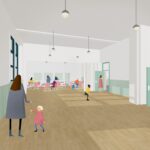We are looking at the leadership role that communities in Scotland are playing in driving Climate Action.
In this Blog Lucy Espeland of Development Trusts Association Scotland highlights 14 development trusts making a real difference. These organisations are working with their communities to combat climate change in ways that benefit local people.
- The Langholm Initiative (Dumfries and Galloway)
Langholm Initiative’s historic land buyout was the largest community buyout in the South of Scotland. Over 5,000 acres of land is now in community ownership which has paved the way for one of the most ambitious plans of a generation: the creation of a huge new nature reserve which will help tackle climate change, restore nature and support community regeneration. The land is secured for generations to come and will be an inspiring case study for communities and landowners alike in how to manage land sustainably in a way that benefits the local economy. The Langholm Initiative’s Wild Eskdale Project is also promoting sustainable tourism in the Esk Valley.
https://www.langholminitiative.org.uk/ - Tayport Community Trust (Fife)
Since 2011, Tayport Community Trust’s successful PLANT programme has been working on projects bringing people together to grow food and flowers, while reducing carbon emissions and enhancing Tayport’s natural environment. This has included the incredibly popular Tayport Community Garden which has provided a community growing space where organisations, groups, families and individuals of all abilities can work, learn and socialise. They also run workshops and climate evenings, run community orchards and generate an income from their apple juice. The Tayport Climate Festival is taking place over the weekend of 24th September 2021.
https://tayportgarden.org/
- Coigach Community Development Company (Highlands)
Coigach Community Development Company runs a community-owned Wind Turbine which generates an income for the local community through its own renewable energy. The income is used to improve Coigach through key actions and projects including a community grants fund. The funding generated from the project is or will be used to fund: more affordable housing; workshop space for new and existing businesses and cultural, heritage and environmental projects. This is a fantastic example of a community using green technology to make their rural economy more sustainable.
https://coigachcommunity.com/ - Greener Kircaldy (Fife)
Greener Kirkcaldy is a community-led charity and development trust working locally to combat the climate emergency, tackle fuel poverty and food insecurity, and bring people together for a more sustainable and resilient Kirkcaldy. They deliver a range of projects, events and skills training to meet the needs and goals of local people – working towards a future where everyone can live better and tread more lightly on our planet. Their work is extensive from running a Fife-wide energy advice service to growing food, teaching local people how to cook and eat sustainably, and much more.
They are lead partners on Climate Action Fife which brings together individuals, communities, local government and businesses to tackle the climate emergency and make Fife a greener and fairer place to live. This National Lottery Community Fund programme delivers a range of activities that build capacity of communities, engage people from all backgrounds and sectors, tackle carbon emissions and deliver ambitious longer-term plans.
https://www.greenerkirkcaldy.org.uk/
- Sustaining Dunbar (East Lothian)
Sustaining Dunbar has been engaging with the community since 2008 to develop locally based responses that meet the needs of the community and address the challenges of reducing carbon footprints and mitigating the impacts of climate change.
This has included: Home energy use – audits and help to install energy reduction measures; Feasibility studies for setting up local energy company; Active travel and transport – car-share club, cycling promotion, safer routes to school and local paths; Waste minimisation – food waste projects and work with schools, Scotland’s first Zero Waste Town leading to setting up of the Zero Waste Hub; Food campaigns – hosted the local food conference that led to the Declaration of Dunbar and setting up of Nourish Scotland, Belhaven Community Garden and recently established Local Good Food Alliance; and promoting local economy – initiated Dunbar Community Bakery, Co-working Hub feasibility study and setting up of the What If Network with thirty local partners to create the What Next action plan to guide recovery from the pandemic as a community which supports everyone to thrive, nature flourishes and respects the wellbeing of all people and the whole planet.
https://sustainingdunbar.org/
- Dollar Community Development Trust (Clackmannanshire)
Dollar CDT has supported the local community to achieve climate goals. This includes: using nature based solutions such as community tree planting to reduce the impact of increased flooding in the area; construction of a future community garden with a planned community wormery for composting, creating a bee friendly environment to support resilience including the planting of wildflower areas throughout the community, in private and public spaces; and hoping to use the mine water from old coal mines as a source of geothermal heat with a view to developing the first geothermal mine water resource in Scotland. They are also planning a 2 day Community Sustainability Festival in October 2021.
https://dollarcdt.com/
- Woodlands Community (Glasgow)
Woodlands Community is a Development Trust, a charitable organisation that aims to improve the Woodlands area of Glasgow and the lives of local people. They achieve this through community-led activity and partnership with both local and national organisations. Their aim is to be a force for positive, community-led change in Woodlands. They want to achieve lasting benefits for the area and the people who live, work or study here and do this through: a community garden giving local people the opportunity to learn new skills and grow their own food; a nature through nurture mental health support service; food initiatives giving people access to healthy, sustainably produced food and much more.
https://www.woodlandscommunity.org.uk/
- Strathdearn Community Developments (Highlands)
Strathdearn is at the front line of climate changes so adapting and building resilience against climate change have been core to Strathdearn Community Developments’ activities and community planning. They aim to support land managers in the community to conserve deep peat and host 200 MW of onshore wind energy generation in and around the community, planning to grow community and private partnerships to create green jobs and increase wellbeing. They also run Electric Vehicle chargers in connection with the Electric A9 Project. Their new Hub will be highly insulated with renewable energy features, digital technology and charging points for electric vehicles and cycles.
https://thestrathdearn.org/community-matters/strathdearn-community-developments-2/ - Linlithgow Community Development Trust (West Lothian)
Linlithgow’s story shows how disparate parts of a community can come together to tackle a common cause and build local resilience. Transition Linlithgow, the town’s grassroots environmental action charity, joined to become part of LCDT this year. This has created one organisation committed to sustainable community development, ready for building on their success to create a thriving 20-minute Net Zero Carbon community.
Their story demonstrates the growing ambition and capabilities of communities to play a key role in the Climate Change agenda.
A key focus for their plans is the creation of employment, education and training opportunities for young people. This relates to the Green Jobs Revolution and Green Covid Recovery, and the Scottish Government’s Climate Emergency Skills Action Plan.
Highlights: - Linlith-go-solar has a Young Energy Enterprise Group
- Linlithgow Young Persons Project employee sits on our Board
- Collaboration with Linlithgow Academy on skills development opportunities
- Employed 2 young people facing barriers to employment, supported by the Community Jobs Fund and the Council.
https://trust-linlithgow.org.uk/
- South Seeds (Glasgow)
South Seeds have a successful community garden known as ‘the Croft’, which is less than 20 minutes’ walk from the COP site. They have a fantastic story behind getting hold of the land to build the Croft, the carbon saved from teaching local people how to grow food and how they run an adopt-a-bed scheme in practice. These stories explain the twists and turns of policy development, community empowerment and local interest in climate change. They also run a tool library, energy advice service, and much more.
https://southseeds.org/
- North West Mull Community Woodland Company (Argyll and Bute)
NWMCWC on the Isle of Mull was the first community owned charity to buy land and forest through the National Forest Land Scheme in 2006 and has since endeavored to create opportunities for people to make a life here through the development of crofts, local affordable housing and a hydro-electricity scheme. They have also created an amenity woodland by replacing coniferous plantations to broadleaf woodland in so nurturing a rich and biodiverse ecosystem helping prevent further ecological and climate collapse.
More recently NWMCWC pounced on the opportunity to purchase the island of Ulva with the vision to repopulate this once thriving farming community. It is currently upgrading its housing stock and boasts a number of cottages, a café, a hostel and a farm. Fossil fuel based transport and farming equipment is being replaced with electric alternatives. A large part of the project is the maintenance and creation of woodland and to use cattle to manage the moorland and help revive large areas of land rendered unproductive by thick bracken and so protect and enhance biodiversity.
http://nwmullwoodland.co.uk/
- Healthy n Happy Community Development Trust (South Lanarkshire)
Healthy n Happy works within a local partnership, Greening CamGlen in order to mobilise and protect our environment, reviving and inspiring local neighbourhoods to fight against climate change and ensure truly sustainable development. This includes enabling a multi-agency approach to establishing significant biodiverse corridors and activity across Cambuslang and Rutherglen (via a local Pollinator Bee Line), supporting biodiverse growing and delivering of a wide range of enjoyable eco-activities.
Healthy n Happy helps people and communities to ‘get active, outdoors and to go green’ and this includes delivering community growing activities, eco learning workshops and comprehensive active travel (walking and cycling) programmes. They also operate our CamGlen Bike Town social enterprise which provides cycling products, services and support in order to break down barriers so everyone can reap the benefits of, and be more connected through, cycling – whilst also recycling bikes and working to improve local cycling infrastructure. All of this work aims to promote greener living and mobilise positive action to address Climate Change.
https://www.healthynhappy.org.uk/
- Connect Community Trust (Glasgow)
Based in Glasgow, Connect operates allotments, electric cars, a furniture reuse and recycling operation and is involved in a wide variety of education and learning opportunities in the environment. Their community is creative and innovative with its approach to addressing climate change and it is continually evolving with the needs in the community that impact on a national basis also. Through the recycling operation (ReConnect Glasgow) they record CO2 emission savings and weight of items diverted from landfill.
Their activities are wide and varied and involve all ages, people with disabilities, elderly, young, families and individuals. Their allotments have supported people with mental health issues, reduced isolation, improved education and skills. Electric vehicles support people on low incomes to have access to vehicles alongside reducing the impact their travel needs have within the organisation. The furniture reuse and recycling operations provide extensive employment and training opportunities alongside diverted bulk household items from landfill and reselling at low and affordable prices for those most in need. Overall, our work is integrated into our youth groups, volunteer and employment programmes and therefore increasing the wider impact and knowledge of climate change in the community.
http://www.connect-ct.org.uk/
- Callander Community Development Trust (Stirling)
Callander Community Development Trust (CCDT) brings people together in Callander to learn about and combat climate change in a number of ways. Working with the local school, they have engaged young people in Climate Fringe Week and are supporting students to put on a Green Careers Fair and a debate with local politicians. CCDT is working in partnership with Callander’s Landscape to maintain healthy rivers in Callander. This project has involved local people planting trees to cool and shade the river banks and to provide habitats to protect fish from predators. CCDT has also set up the first and largest community-owned hydro scheme in Scotland which displaces 1000 tonnes of carbon each year, the income from this is used to fund vital community projects.
https://incallander.co.uk/ccdt_home

Nick Cullen
Nick is a past coordinator for the Climate Fringe platform and Climate Fringe Festival, working on strategy, website development and communications. He spent two years at SCCS in the lead up to COP26 and led on developing the Homestay Network, volunteering programme, COVID-19 safety, and many other aspects of logistics and operations in collaboration with the COP26 Coalition.




